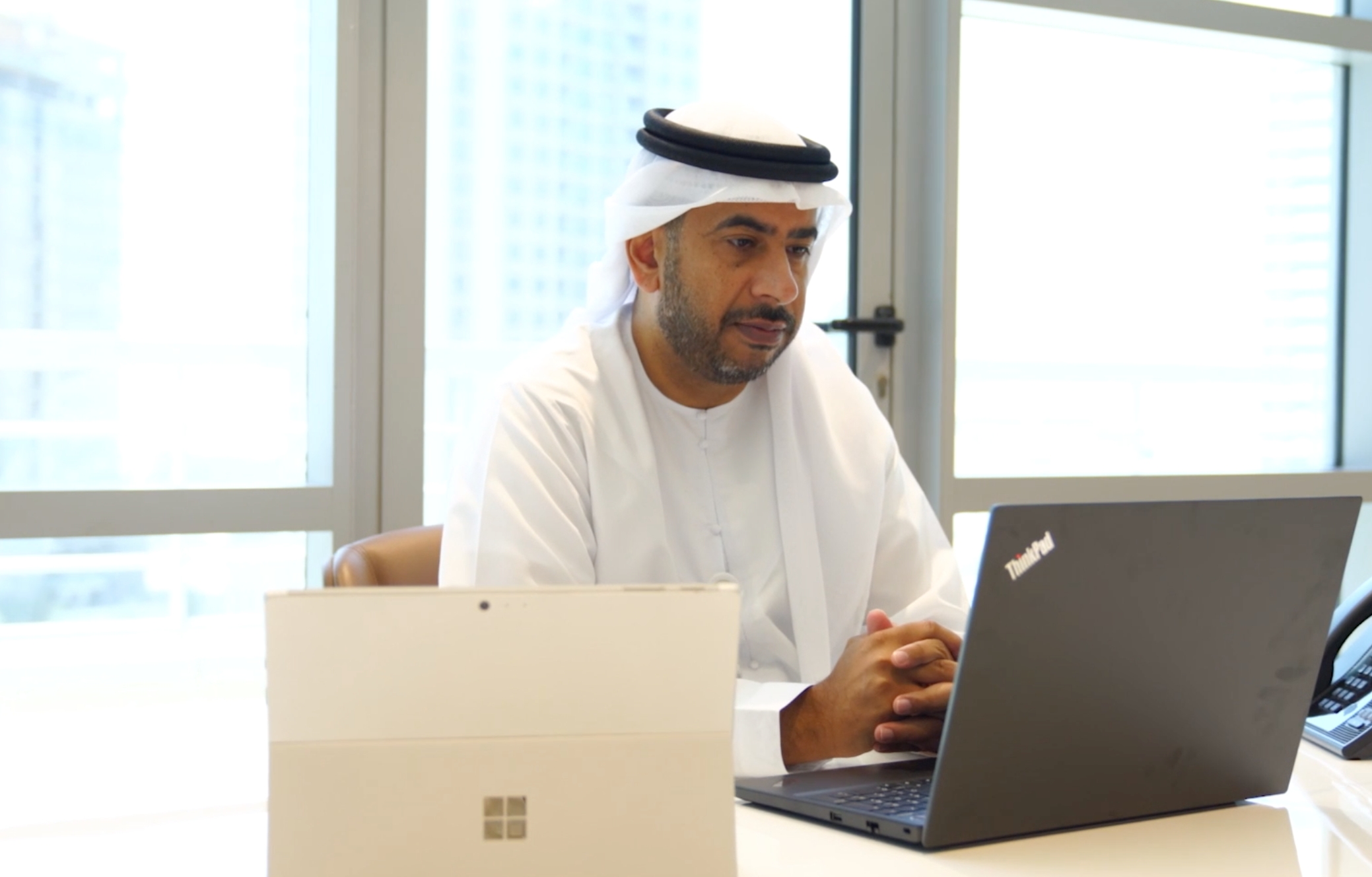In cooperation with Abu Dhabi School of Government (ADSG), Rabdan Academy, the academic institute specialized in safety, security, defense, emergency readiness and crisis management, organized a series of online panel discussions under the title “Strategic Business Continuity and Crisis Management Leadership Forum”. The forum aimed to address the future challenges of COVID-19 pandemic facing most government agencies in Abu Dhabi, and draft plans to overcome those challenges and enhance expertise in fields of business continuity and crisis management. The sessions, held on live streaming, welcomed over 750 officials from the Abu Dhabi government.
The sessions aimed at discussing aspects of business continuity and crisis management, fields in which Rabdan Academy has great experience. The Academy aimed at sharing its expertise in the safety, security, defense, emergency readiness and crisis management sectors with all governmental agencies in Abu Dhabi.
In this regard, H.E. Alia Abdulla Al Mazrouei, Acting Director General of ADSG, said: “The series of panel discussions reaffirms the importance of cooperation among government agencies and underscores their team spirit, especially in times of crisis. Moreover, it reflects the vision of our wise leadership aimed at building a sustainable knowledge-based economy. These forums help participants to adapt to the new reality of social distancing imposed under the current circumstances across various fields, and to deal with the impact of COVID-19 outbreak in line with global best practices that are compatible with Abu Dhabi context. ADSG will continue to focus on identifying and meeting the future needs of the emirate, as well as enhancing the competencies of government employees to become more efficient in their current and future jobs.”
Emphasizing Rabdan Academy’s plan to continue implementing its strategy, Dr. Faisal Al Ayyan, Academy Vice President, said: “Relying on global state-of-the-art technology, we always endeavor to develop flexible strategic plans that adapt to local and international changes, and that meet the most important requirements across various sectors. Under the vision of our wise leadership our strategies are integrated with the community, as we work to share our experiences with different sectors of the Abu Dhabi government, especially those that are related to the fields and specialties of the Academy.”
“The Academy is making a great effort to provide various sectors with global best practices in crisis and disaster management based on modern technology that contribute to understanding the requirements and developments on the local and international arenas, and providing a promising vision for all sectors by exchanging ideas and presenting perspectives of how to overcome crises in a manner that serves the country and protects its gains,” added Al Ayyan.
Dr. Faisal Al Ayyan, Vice President of Rabdan Academy, inaugurated the panel discussions with welcoming remarks addressing senior leaders, officials and decision-makers that participated representing different government agencies in Abu Dhabi.
Over the course of several sessions, the first forum, held under the title “Strategic Business Continuity and Crisis Management Leadership Forum” discussed the issues of business continuity in times of crisis and emergencies, optimal strategies to reach the highest levels of readiness and preparedness with the highest quality, and reducing the adverse impacts of risks and threats, especially in light of the local and global changes that are taking place due to the spread of COVID-19. The sessions also addressed the overall strategic and dynamic implications of the pandemic, future aspirations of the post-pandemic era, re-engineering and sustaining supply chains, methods for building social cohesion and management of national and international media.
Crisis Management Strategy
The forum started its activities with “The Strategic Crisis Management and Business Continuity for Health Pandemic (COVID-19)” session, moderated by Dr. Khameis Al Abdouli, Assistant Professor BCM & IEM Program. The session hosted a select group of Rabdan Academy lecturers, such as Dr. Carlos Samuel is a Lecturer in Integrated Emergency Management; Dr. Khawla Al Hattawi, Assistant Professor in General & Foundation Education; Dr. Amadeus Michael Kubicek, Assistant Professor BCM & IEM; Dr. Sudha Sudhir Arlikatti, Dr. Komal Raj Aryal and Mr. Frank Delgrosso.
The first session focused on historical comparisons of the strategic risks of COVID-19, methodologies for assessing strategic risks, continuity of strategic business in light of the COVID-19 pandemic, and comparing the risk assessment and strategic response options adopted by the US, Australia and a number of East Asian countries.
On the other hand, the second session, held under the title “Strategic and Micro-dynamic Implications of COVID-19”, was moderated by Dr. Faisal Al Ayyan, Academy Vice President, with the participation of Dr. John George Hatzadony, Assistant Professor and Chair of Homeland Security Program; Dr. John Harrison, Associate Professor Homeland Security Program; Dr. Jolene Anne R Jerard, Associate Professor Homeland Security Program; Dr. Perry Stanislas, Associate Professor Policing and Security; Dr. Mark Henry Roycroft, Assistant Professor Policing and Security Program and Dr. Johannes Oosthuizen. The session highlighted topics such as the economic and security impacts of the pandemic, media and transparency and media warfare between the superpowers, management of the Silk Road project supply chain business continuity, and the repercussions of the COVID-19 pandemic on the United Nations and other international organizations.
Held under the theme “Strategic Thinking and Aspirations Following the COVID-19”, the third session was moderated by Dr. ShammaHamdoon Al Naqbi, Chair of the General Education and Foundation Program, with the participation of Dr. Amanda Davies, Chair of Policing and Business Continuity Programs, Assistant Professor Science in Policing and Security; Dr. Khameis Al Abdouli, Assistant Professor BCM & IEM Program. The panel discussion highlighted the best practices adopted by the UAE in light of the pandemic, the importance of transferring interest and resources towards critical functions and methods to do so, lessons learned to enhance the work environment in the aftermath of the pandemic, as well as looking ahead to the future and preparing for the scenarios expected after the end of the COVID-19 pandemic.
For his part, Faisal Al Kaabi, Dean of Faculty of Resilience at Rabdan Academy, said: “We are keen to exert more efforts and share its fruits with various sectors to successfully overcome the current crisis and gain a rich experience that we can build on in the future. The positive interaction witnessed by the forum over its various sessions, by a group of prominent government leaders in Abu Dhabi, confirms the ability of the Emirati community to face challenges, overcome and manage crises in times of disasters, and gain the expertise and successful experiences that contribute to building a better future for the coming generations.”
Risk Assessment
The second forum was organized under the title “COVID-19 & Supply Chains: Supply Chain Disruption, Re-engineering and Sustainability”, And moderated by Dr. ShammaHamdoon Al Naqbi with the participation of Dr. John George Hatzadony, Chair of Homeland Security Program; Dr. Sudha Sudhir Arlikatti, Assistant Professor BCM & IEM and Dr. Mark Henry Roycroft, Assistant Professor Policing and Security Program.
The forum featured three discussion panels which addressed supply chain operations affected by COVID-19, such as assessing the risks facing supply chain management, ways of leveraging digital technologies to identify locations of hospitals, police departments and quarantine facilities, as well as the importance of police departments in dealing with disruptions and sustainability of supply chains according to the international practices.
The Impact of Fake News in Times of Crisis
During the third forum, held under the title “Building Community Cohesion: Managing Global and National Media”, Dr. Faisal Al Kaabi, Dean of the Academy, with the participation of Dr. Amanda Davies, Chair of Policing and Business Continuity Programs, Assistant Professor Science in Policing and Security; Dr. John Harrison, Associate Professor Homeland Security Program and Dr. Idress Allam, Assistant Professor BCM Program, discussed the impact of fake news in light of the COVID-19 crisis on security and police and international diplomacy and cooperation. The session also assessed risks of the influence of the media on crisis management.
Organized Crime
The fourth forum, which was held under the title “ Protecting Our Borders: The Changing Face of Fraud and Organized Crime- COVID-19”, featured three panel sessions, which touched upon witness protection programs in light of the changing nature of crimes, ways to control the changing patterns of crimes resulting from the COVID-19 crisis, as well as a comparative analysis of the emergency management cycle and its relation to the witness protection programs.
In conclusion, Dr. Shamma Al Naqbi said: “The forums witnessed a positive interaction by the attendees who represent the most important government leaders in Abu Dhabi, and this was reflected in the diversity and importance of the questions asked, which indicate the depth of their interest in the topics presented by the forums, the most important of which is business continuity and crisis management in times of disasters.”







